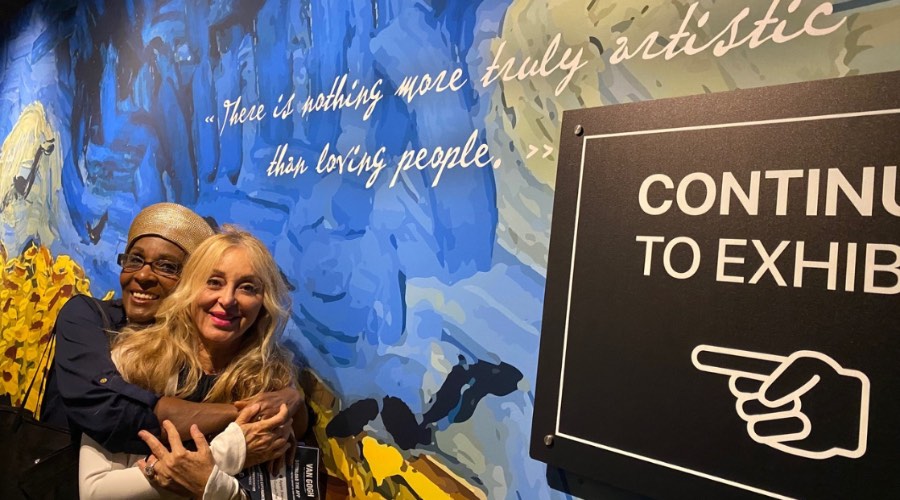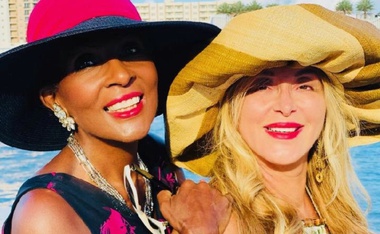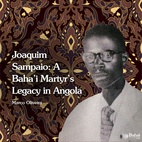The views expressed in our content reflect individual perspectives and do not represent the authoritative views of the Baha'i Faith.
Years ago, at a gathering with many Baha’is in my home, I recited a poem I wrote about racism and exclusion I had experienced as a woman of African descent and the resulting pain I felt in my heart. Before I finished reciting the last stanza, I was shocked to hear the wails of an Iranian man, crying and heartbroken over the trauma I had experienced.
I, a young Black woman, never thought an older Iranian man could empathize with my pain. We come from different backgrounds, cultures, and experiences, and yet, he was grief-stricken over the pain I endured in my world. His empathy touched me deeply.
As Abdu’l-Baha, one of the central figures of the Baha’i Faith, said at a talk in Paris in 1911:
We work and pray for the unity of mankind, that all the races of the earth may become one race, all the countries one country, and that all hearts may beat as one heart, working together for perfect unity and brotherhood.”
Although that man and I come from different racial and cultural backgrounds, our hearts did “beat as one heart” that day, and that’s what Baha’is around the world are striving towards. Nowadays, many people refer to this experience as “intercultural empathy.”
What Is Intercultural Empathy?
My mother, Barbara Talley — an African American Baha’i who has had many close intercultural friendships — says, “To me culture defines all the social, emotional, material, and physical spaces we inhabit to create what we call life. Intercultural empathy would be that empathy that moves beyond the initial attraction that one person has for another because they share a common purpose or have similar likes and dislikes, but also respects and appreciates the cultural uniqueness that comes with those relationships, not requiring people to assimilate to be appreciated.”
“We each have our own national origin, ethnicity, environments, or backgrounds that we’ve been raised in — that’s the beauty of our humanity,” says Hoda Hosseini, an Iranian Baha’i who is always seeking to grow and develop her intercultural empathy. “It’s our diversity. So, intercultural empathy is the ability of diverse ethnic groups or backgrounds being able to feel challenges or hardships that collectively affect another population.”

Examples of Intercultural Empathy
So, what does intercultural empathy look like? Hoda explained that empathy involves “sitting with another person’s pain, accepting it, believing it, and asking, ‘How can I help you?’” Her late friend, Lenise Jackson Gaertner — an African American Baha’i who passed away around 15 years ago — exemplified this intercultural empathy when Hoda needed it most.
Hoda says, “She saved my marriage. She saved me from killing myself when my kids were teenagers. I’m not exaggerating.”
At a time when no one could answer Hoda’s questions about raising teenagers, Lenise helped Hoda navigate her life as a mother in the United States. “She literally held my hand on the phone. She would come visit me. …She would come and spend 2 or 3 months at a time,” recalled Hoda.
The Baha’i writings say:
For one of the greatest divine wisdoms regarding the appearance of the holy Manifestations is this: The souls may come to know each other and become intimate with each other; the power of the love of God may make all of them the waves of one sea, the flowers of one rose garden, and the stars of one heaven.
Hoda also later formed a deep connection with my mother after they spent hours chatting with each other and “hearing about each other’s life’s journeys, challenges, and difficulties.” They are best friends who have a heart connection, which is what my mother believes is essential for empathy.
My mother says, “I feel empathy when the person not only sees me and hears me, but when they also feel my pain, are with me in my pain, and I feel less alone in that pain because of their heartfelt accompaniment. …When I visit Hoda, she treats me and my children like family. I am not a color; I am just Barbara. She is not Iranian; she is just Hoda. We tackle the race question together — the good, the bad, and the ugly. We are like sisters [and are] beyond friends. We talk almost every day about the world from our racial or ethnic lenses, and we learn and, most importantly, laugh and grow together.”
How Do You Develop Intercultural Empathy?
Both my mother and Hoda believe that close intercultural friendships are a great way to develop intercultural empathy.
My mother says, “Proximity, time, and intimate spontaneous conversations allowed our relationship to flourish. I care about Hoda’s culture, because I care about her.” My mom explained that Hoda also helped her understand the significance of the mass protests in Iran after Mahsa Amini’s death.
She says, “We understand that much of our disagreements come from just not knowing, but we care enough to help the other understand. I ended up creating a video explaining to others why the protests were more than about the hijab.”
Baha’u’llah, the prophet and founder of the Baha’i Faith, asked:
Know ye not why We created you all from the same dust? That no one should exalt himself over the other. Ponder at all times in your hearts how ye were created.
Since We have created you all from one same substance it is incumbent on you to be even as one soul, to walk with the same feet, eat with the same mouth and dwell in the same land, that from your inmost being, by your deeds and actions, the signs of oneness and the essence of detachment may be made manifest.
Hoda often calls this quote to mind as she strives to look through my mother’s eyes and see how “her life is impacted as a Black woman, a Black mother, and a Black grandmother.”
“I never seek to compare and contrast [our pain], because that takes away from both of [our experiences]. …I ask myself, ‘How would I feel if I was in their shoes? What would it look like? How would it feel?’”
Hoda shared that her friendships helped her understand and recognize the invisibility that many Black people face. She says, “When you actually notice it and see a person of African descent not being seen…it doesn’t go away from your memory. It becomes a part of your DNA. Book reading evaporates, but a feeling you never forget. That comes from actually walking with the same feet, eating with the same mouth, [and] dwelling in the same land.”
Why Intercultural Empathy Is Important
Abdu’l-Baha said:
If you desire with all your heart, friendship with every race on earth, your thought, spiritual and positive, will spread; it will become the desire of others, growing stronger and stronger, until it reaches the minds of all men.
Hoda says, “My best friends have always been people who don’t look like me, who are not from my same culture, who don’t speak the same mother tongue, who are not the same age, who don’t live in the same zip code.”
She believes that “your whole world becomes so much more expanded” and beautiful with every diverse connection that you make. “Who wouldn’t want to see the world through a whole 360 degrees rather than two degrees through their own keyhole? That’s the world-embracing vision. Your own reality gets expanded and becomes richer and more meaningful.”
As my mother says, “A foundational principle of the Baha’i Faith is the oneness of humanity. We understand that unity of all people is critical to bringing peace on Earth. Unless we seek out, show up in a humble posture of learning, and see the hearts in people — which all beat the same and pump the same blood — hatred, war, and discord will continue. We are 99.9% the same. As Martin Luther King said, ‘We must learn to live together as brothers or perish together as fools.’”
You May Also Like
Comments

















One of your many fans, and your mother's, and Hoda's,
Anne
One of your many fans, and your mother's, and Hoda's,
Anne